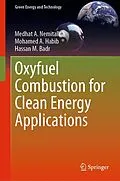This book aims to be the reference book in the area of oxyfuel combustion, covering the fundamentals, design considerations and current challenges in the field. Its first part provides an overview of the greenhouse gas emission problem and the current carbon capture and sequestration technologies. The second part introduces oxy-fuel combustion technologies with emphasis on system efficiency, combustion and emission characteristics, applications and related challenges. The third part focuses on the recent developments in ion transport membranes and their performance in both oxygen separation units and oxygen transport reactors (OTRs). The fourth part presents novel approaches for clean combustion in gas turbines and boilers. Computational modelling and optimization of combustion in gas turbine combustors and boiler furnaces are presented in the fifth part with some numerical results and detailed analyses.
Autorentext
Hassan M. Badr has a PhD from the University of Western Ontario in Canada and is a Professor at the Mechanical Engineering Department of the King Fahd University of Petroleum & Minerals in Dhahran, Saudi Arabia.
Inhalt
Book Table of Contents
Preambles
Dedication
Contributing Authors
Preface
Foreword
Acknowledgments
Chapter 1: Introduction
1.1 Global Warming
1.1.1 Carbon budget for the 2 oC limit
1.1.2 Required atmospheric CO2 reduction
1.2 Status of renewable energies
1.2.1 Market and industry trends
1.2.2 Renewables for global warming control
1.3 carbon capture and storage (CCS) techniques
1.3.1 carbon capture technologies
1.3.1.1 Pre-combustion carbon capture technology
1.3.1.2 Post-combustion carbon capture technology
1.3.1.3 Oxy-fuel combustion carbon capture technology
1.3.2 Carbon storage techniques
1.3.2.1 Enhanced oil recovery (EOR)
1.3.2.2 Depleted oil/gas fields
1.3.2.3 Deep saline aquifers
1.3.3 Carbon utilization techniques
1.4 Approaches for oxy-fuel combustion technology
1.4.1 Conventional combustion systems
1.4.2 Oxygen transport reactors (OTRs)
1.5 Why oxy-combustion
1.6 Oxy-combustion in gas turbines
1.6.1 Required system modifications
1.6.2 Gas turbine performance under oxy-combustion
1.6.3 Emissions characteristics
1.6.4 Flame stability
1.7 Bio-energy with CCS (BECCS) for negative CO2 emissions
1.7.1 Concept of BECCS
1.7.2 Status of BECCS
1.8 Summary
References
Chapter 2: Application of Oxyfuel Combustion Technology into Conventional Combustors
2.1 Introduction
2.2 Oxy-fuel combustion characteristics
2.2.1 Reactions and emission characteristics
2.2.2 Oxy-combustion systems
